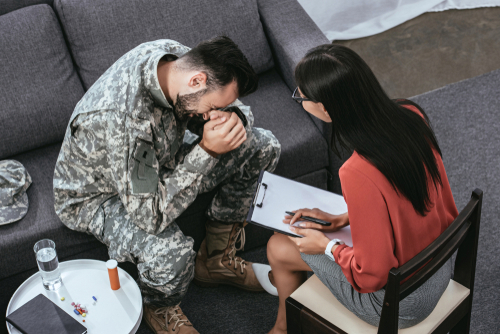
Related resource: Top ten Online Colleges for Psychology
Treatment of Post-traumatic Stress Disorder
Many veterans have post-traumatic stress disorder (PTSD) when they are discharged. Their PTSD could result from an overwhelming experience or trauma. It is associated with repeated flashbacks, intrusive thoughts, nightmares, and emotional disturbances. People with PTSD may avoid situations, people and circumstances that remind them of the event, such as Independence Day fireworks for a veteran whose PTSD is related to an explosion. People with PTSD may have memory problems, emotional detachment or problems concentrating. They are often easily startled and may feel guilty about the event. Psychologists offer therapy and counseling for all of these PTSD issues.
Counseling for Anxiety and Depression
Veterans also have a high rate of anxiety and depression. Poor health, financial problems or unemployment may be a trigger. After being discharged from military service, some veterans have a hard time relating to others. They may feel as if nobody understands what they went through during their period of active duty. Grief from losing friends in their unit of duty or isolation upon discharge can exacerbate feelings of anxiety and the severity of depression. Psychologists offer counseling and may coordinate with a psychiatrist for medications used in the treatment of anxiety and depression.
Therapy for Traumatic Brain Injury
May veterans of Operations Iraqi Freedom, Enduring Freedom, and other military operations have traumatic brain injuries. A traumatic brain injury results from a severe blow or impact to the head. A person who experiences a traumatic brain injury can have lifelong mental and physical health problems. Some of the symptoms include memory loss, erratic emotions, increased anger and a propensity to violence and thoughts of self-harm. A psychologist offers ongoing counseling for people who have a traumatic brain injury. About 15 percent of the veterans who fought in active duty in Iraq and Afghanistan have a traumatic brain injury, explains Good Therapy.
Recovery From Military Sexual Trauma
About 1 percent of male veterans and 22 percent of female veterans are survivors of military sexual trauma. The military sexual trauma could include harassment, assault or rape. It can happen regardless of the person’s rank, gender or location. Depression, substance abuse, anxiety, PTSD and suicide are possible complications of military sexual trauma. As many as 60 percent of female veterans develop PTSD, 75 percent develop depression, and 30 percent develop anxiety as a result of military sexual trauma. Psychologists offer different therapeutic techniques to help veterans with military sexual trauma.
Conclusion
Understanding the services available to veterans could help a veteran, their family and their friends ensure that their transition to civilian life is as smooth as possible. For a person earning a degree in psychology, knowing how they could help veterans in their professional life might provide the motivation to choose to work at a veteran’s hospital or clinic. Knowing, “How do psychologists help veterans?” could help a person choose a specialty of psychology or a job setting that affords them more interactions with veterans.
Related Resources:

